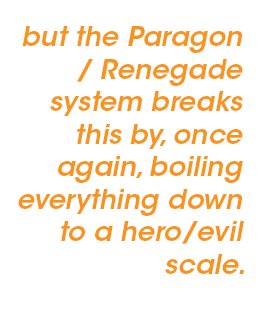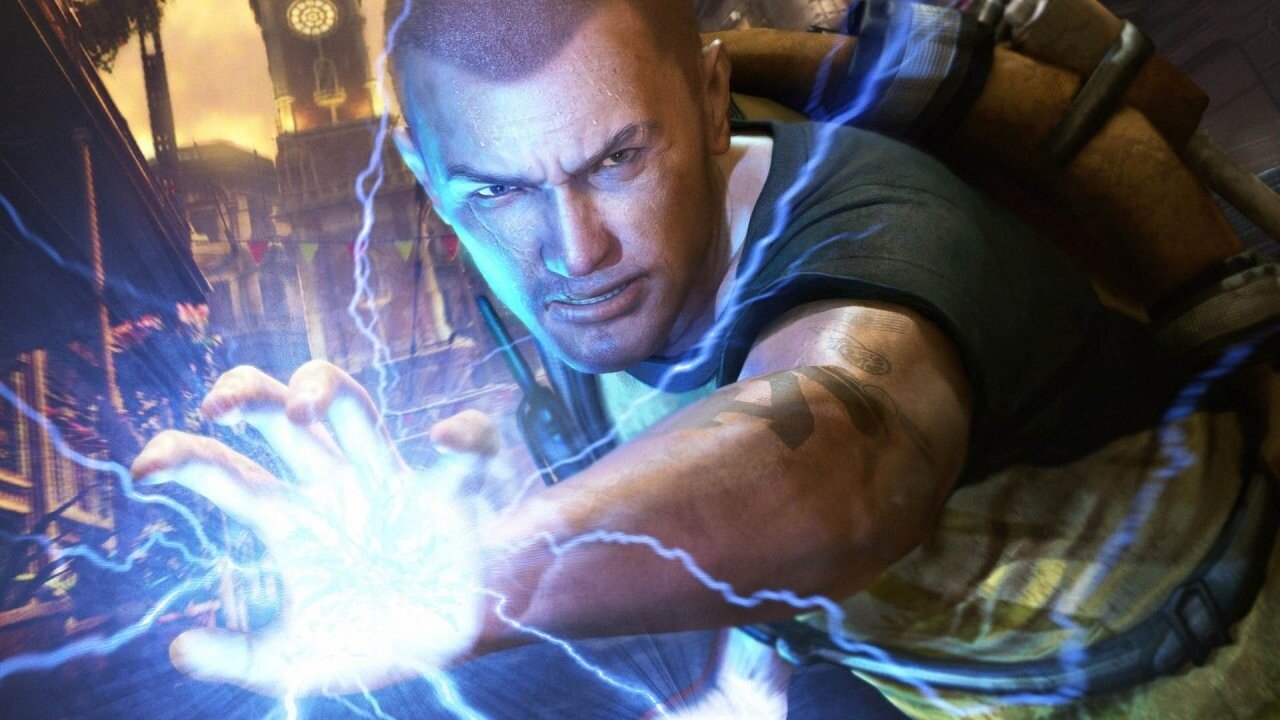Everyone knows that morality is relative.
 My views on, say, the kind of punishment that a starving person deserves for stealing from the grocery store is likely to be different from someone else’s. This is common. Philosophical articles and laws are constantly being thought about, written and revised based on shifting perspectives regarding morality because, simply enough, morals are difficult, multi-faceted things that are impossible to pin down.
My views on, say, the kind of punishment that a starving person deserves for stealing from the grocery store is likely to be different from someone else’s. This is common. Philosophical articles and laws are constantly being thought about, written and revised based on shifting perspectives regarding morality because, simply enough, morals are difficult, multi-faceted things that are impossible to pin down.
That’s how morality works in real life. In videogames it’s often quite a bit simpler.
Many games present moral choices as a binary — good or bad, right or wrong — in complete contrast to how most decisions and viewpoints function in their players’ daily lives. In an effort to branch out from linear narrative techniques (the story always begins and ends in the same way, regardless of player input) some titles offer up “moral dilemmas” that are really anything but.
Two of the most notable examples, Infamous and Bioshock, offer gameplay moments where players are asked to choose between two different choices in a wholly black and white take on morality. Both are concerned with the concept of power. In Infamous players must choose whether or not they believe improving their superhuman skill-set is worth screwing over the citizens of Empire City or New Marais. In Bioshock the choice is between murdering little mutant girls, allowing for faster skill upgrading, or saving them. The hero/villain dichotomy in these games is an incredibly simple one. The moral choice is, really, no choice at all. In both of these games the player is just asked whether or not they want to play as an evil character or a good one.
Unless s/he has the mentality of a serial killer it’s incredibly obvious what the “right choice” actually is (hint: don’t kill children or suck the life force out of injured civilians) in these games. While the rest of the experiences offered by the Bioshock and Infamous series are interesting, the addition of moral choices really offer nothing other than an optional way to replay through the games’ stories in a different way, picking between “good” and “bad runs.”

 Bioware’s Mass Effect goes some way toward correcting this issue, but still falls short of truly blurring the lines of a binary morality. The developers often present really interesting choices in their titles, offering dilemmas where the validity of one choice can be argued alongside that of another with equivalent rationale (personal opinion on ensuring a species’ survival while risking galactic safety or choosing who to ally with in matters of centuries long ethnic grudges where both sides are both to blame), but the Paragon/Renegade system breaks this by, once again, boiling everything down to a hero/evil scale. Dragon Age, also from Bioware, is marred by similar issues, difficult choices weighed by the seemingly arbitrarily programmed value systems entrenched in the mechanics.
Bioware’s Mass Effect goes some way toward correcting this issue, but still falls short of truly blurring the lines of a binary morality. The developers often present really interesting choices in their titles, offering dilemmas where the validity of one choice can be argued alongside that of another with equivalent rationale (personal opinion on ensuring a species’ survival while risking galactic safety or choosing who to ally with in matters of centuries long ethnic grudges where both sides are both to blame), but the Paragon/Renegade system breaks this by, once again, boiling everything down to a hero/evil scale. Dragon Age, also from Bioware, is marred by similar issues, difficult choices weighed by the seemingly arbitrarily programmed value systems entrenched in the mechanics.
The only games that seem to have found a good balance are titles like The Witcher or Telltale Games’ The Walking Dead adaptation. The Witcher delights in the ambiguity of every player decision, throwing the player into the role of a man with few concrete ideals and asking her/him to do what they think is right. Every decision has a way of coming back to haunt The Witcher’s audience, seemingly righteous actions twisting around and leading to unfavourable consequences. The Walking Dead takes the same tact. Currently on its second of five episodic releases, the game has already been filled with nearly impossible moral dilemmas. Deciding on whether to save the life of one person or another, the side to take in a heated, potentially homicidal argument; each of these choices deviate from a strict sense of right and wrong and fall, in large part, to the player’s own morals. The Walking Dead and The Witcher don’t punish or reward their audience for making the right or wrong choice — they instead seek to portray the messiness of personal value systems when applied to a larger context.
In these titles, traditional portrayals of videogame morality are thrown on their head, made much more intricate — and interesting — as a result. They represent the ideal future of the medium’s approach to moral choices, providing experiences that obscure game mechanics and deepen the illusion of delving into truly complex and interactive worlds.
***
Reid McCarter is a writer, editor and musician living and working in Toronto. He has written for sites and magazines including Kill Screen, The Escapist and C&G Magazine. He founded, writes and edits the videogame blog digitallovechild.com and is Twitter-ready @reidmccarter.




